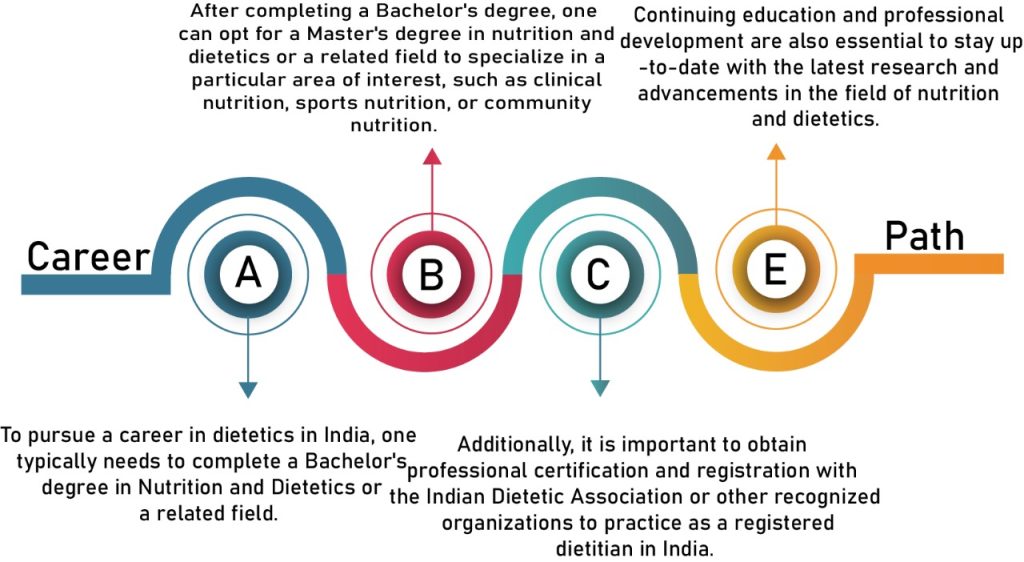Dietetics is the branch of healthcare that deals with the application of nutritional science to promote health, prevent and manage diseases, and optimize human performance. Dietitians are trained professionals who provide evidence-based dietary advice and support to individuals, groups, and communities. They work in a variety of settings, including hospitals, clinics, schools, universities, private practice, and the food industry. Dietitians use their knowledge of food, nutrition, and metabolism to develop personalized nutrition plans and help clients make informed choices about what they eat. They also work closely with other healthcare professionals to ensure the best possible outcomes for their patients.

Work description
The work of a dietitian involves assessing, diagnosing, and treating nutritional problems and developing personalized nutrition plans to promote health and prevent or manage diseases.
Dietitians work with individuals of all ages and backgrounds, including those with specific health conditions such as diabetes, cancer, or heart disease.
They use their knowledge of food science, physiology, and metabolism to create nutrition plans tailored to the unique needs of each client.
They may also provide counseling and education on healthy eating habits and lifestyle changes.
In addition to working with clients, dietitians may also work with food service providers, schools, and community organizations to promote healthy eating and wellness initiatives.
Ability
Ability to make a positive impact on individuals and communities by promoting healthy eating habits and preventing or managing diseases through nutrition.
Lucrative salaries
Wide range of job opportunities in various settings, including healthcare, food industry, education, research, and private practice.
Opportunities for innovation
Flexibility in work schedule and potential for part-time or freelance work.
Versatility
Opportunity to continually learn and stay up-to-date with new research and advancements in nutrition science.
Flexibility
High job satisfaction and sense of fulfillment from helping others achieve their health and wellness goals.
High stress
May require long hours and high stress levels in certain settings, such as hospitals or clinics.
Long hours
May involve working with clients who are resistant to change or who have complex health conditions.
Competitive field
May require continuing education and certification to maintain licensure.
Constant learning
Potential for lower salaries compared to other healthcare professions, depending on the specific job and location.
Isolation
Limited career growth opportunities in certain settings, such as schools or government agencies.
The cost of pursuing a career in dietetics in India can vary depending on various factors, such as the type of program, the location of the institution, and the duration of the program.
Generally, the cost of a bachelor’s degree in dietetics can range from INR 50,000 to INR 2 lakhs per year, while a master’s degree can cost between INR 1 lakh to INR 5 lakhs per year.
Additionally, there may be additional costs associated with textbooks, lab fees, and other expenses. However, scholarships and financial aid may be available to eligible students to help offset these costs.
[wpcharts type=”horizontalbarchart” bgcolor=”red:gray:yellow,blue:gray:yellow,random:gray:yellow,purple:gray:yellow” min=”0″ legend=”true” titles=”2 year , 5 year” values=”3,7,5,12″]
The earning potential of a dietitian in India can vary depending on various factors, such as experience, qualifications, location, and employer.
Generally, the starting salary for a dietitian with a bachelor’s degree in India can range from INR 2-4 lakhs per year, while a dietitian with a master’s degree and several years of experience can earn between INR 5-8 lakhs per year.
However, the earning potential can be higher for dietitians who work in the private sector, such as in corporate wellness programs, sports nutrition, or private practice, where they can earn up to INR 15-20 lakhs per year.
Additionally, dietitians who work in the government sector or public hospitals may earn lower salaries but may have access to benefits such as job security, pensions, and other perks.
[wpcharts type=”horizontalbarchart” bgcolor=”red:gray:yellow,blue:gray:yellow,random:gray:yellow,purple:gray:yellow” min=”0″ legend=”false” titles=”Entry-Level, Mid-Career, Senior-Level ” values=”5,15,25,35,45,55″]
Solid foundation in science, particularly biology, chemistry, and physiology.
Excellent communication skills to effectively communicate nutrition information to clients and other healthcare professionals.
Ability to work independently and as part of a team to develop and implement nutrition plans.
Good analytical and problem-solving skills to assess and diagnose nutritional problems and develop effective solutions.
Strong attention to detail to accurately record and analyze nutritional information and create personalized nutrition plans.
Compassionate and empathetic nature to work with clients from diverse backgrounds and with various health conditions.
Commitment to ongoing learning and professional development to stay current with the latest research and trends in nutrition science.
Lack of attention to detail or poor organizational skills.
Inability to adapt to changing technologies and trends.
Lack of interest or passion for the field.
Poor communication or teamwork skills.
Inadequate math and science skills.
Impatience or inability to work through complex problems.
Tendency to procrastinate or miss deadlines.
Work-life balance
As a dietitian, work-life balance can vary depending on the specific job setting and responsibilities. Some positions, such as those in clinical settings, may require long hours and occasional weekends, while others, such as private practice, may offer more flexibility in terms of scheduling. In general, though, dietitians can often find a good work-life balance by prioritizing self-care, setting clear boundaries with work tasks, and seeking support from colleagues and loved ones. Additionally, pursuing continuing education and professional development can help dietitians feel more fulfilled in their careers, which can in turn contribute to a healthier work-life balance.

Ability to make a positive impact on individuals’ health and wellbeing.
Opportunities to work in a variety of settings, including hospitals, clinics, schools, research facilities, and private practice.
Potential to work with diverse populations and customize nutrition plans to meet individual needs.
Ongoing learning and professional development opportunities to stay current in the field.
Ability to collaborate with other healthcare professionals, such as physicians and nurses, to provide comprehensive care to patients.
Potential for career advancement and leadership roles within the field.
Clinical dietetics
Working in hospitals or medical facilities to provide medical nutrition therapy to individuals with specific medical conditions or illnesses.
Community dietetics
Working in public health or community-based settings to promote healthy eating and prevent nutrition-related diseases at a population level.
Management dietetics
Overseeing food service operations in healthcare facilities, schools, or other institutions.
Consultant dietetics
Working as an independent contractor or consultant to provide nutrition services to individuals, businesses, or organizations.
Sports dietetics
Working with athletes and physically active individuals to optimize their nutrition for performance and recovery.
Conclusion:
In conclusion, dietetics is a dynamic and rewarding career choice that offers a wide range of opportunities to make a positive impact on individuals’ health and wellbeing. Whether working in clinical settings, community-based programs, or private practice, dietitians have the ability to customize nutrition plans to meet individual needs and collaborate with other healthcare professionals to provide comprehensive care. With ongoing learning and professional development opportunities, as well as the potential for flexible work arrangements and career advancement, dietetics is a field that offers both personal and professional fulfillment.



